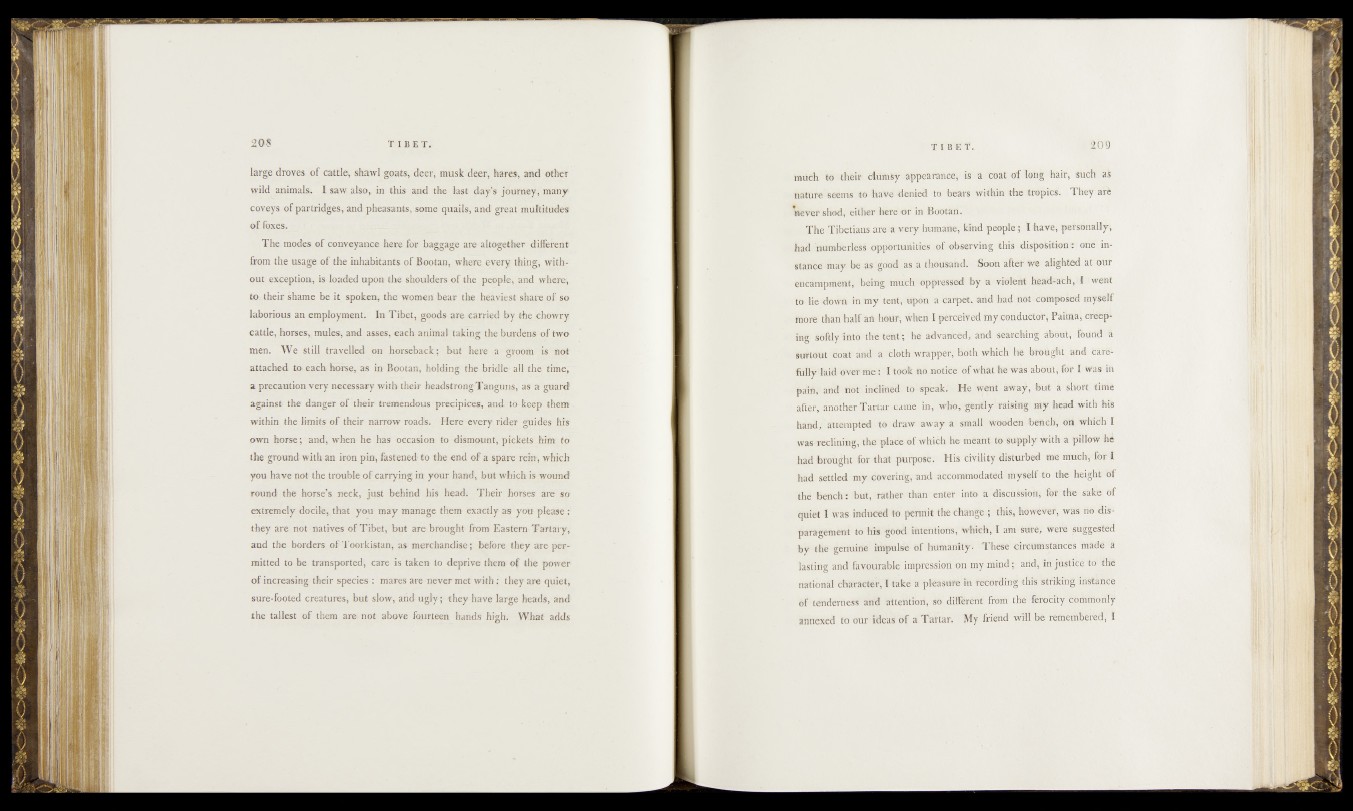
targe droves, of cattle, shawl goafs, deer, roust deer, tees, and other
wild animals. 1 saw also, in this and the tast days journey, many
coveys of partridges,, and pheasants, some quails, and; great multitudes
of foxes.
The modes ©f conveyance here for baggage are altogether different
from the usage ©f the inhabitants, of Boo tan, where every thing, without
exception, is loaded upon the shoulders of the people, and where,
to their shame be it spoken, the women hem; the heaviest share of so
laborious an employment. In Tibet, goods are carried by the chowry
cattle, horses, mules, and asses, each animal taking the burdens of two
men. We still travelled on horseback; hut here a groem is not
attached to. each horse, as in Bootan, holding the bridle all the tone,
a precaution very necessary with their headstrong Tanguns, as a guard
against the danger of their tremendous precipices, and, to keep them
within the limits of their narrow roads. Here every rider guides Ms
own horse; and, when he has occasion to dismount-, pickets him to
the ground with an iron pin, fastened’ to the end of a spare rein, which
yon have not the trouble of carrying in your hand, but which is wound1
round the horse’s neck, just behind his head. Their horses are so
extremely docile, that you may manage them exactly as you please:
they are not natives of Tibet, but are brought from Eastern Tartary,
and the borders of Toorkistan, as- merchandise; before they are-permitted
to be transported, care is taken to deprive1 them of the power-
of increasing their species : mares are never met with: they are quiet,
sure-footed creatures, but slow, and ugly; they have large heads, and
the tallest of them are not above fourteen hands high. What adds
much to -theit d'ümsy appeatteGëj is a coat of tohg hair; such as
nature seems » . to the tropics. Tfiey ârè
never shod, eifhw here or in Boötaai,.
The<Tibéti^s>£Çf^a very hvumahe, Irihd people; t have; pefsbnaliy;
had sumberiéSi öf^bttttdiries; ;©f ofoserNdng;s|hii dissolution t otiè instante
may be As -good as a thoutahde Soon after we alighted at our
eHcdmpmeiif j hêh% tóM chöp^ by a viöfeM heótf-öfcfe, Iit wëfflt
te lié afewé 'in ïïijf teift^npón â carpet, add trad ttöt -ceiHpOsed mySéîf
ttOÿ» than half «à hour; ^feferi I perefebfed ïkyjöè'ftduetoïj PaltUftj creeping
seftlyTfflto thé tent; he advanced,;aii& searching' àbëiàtj found a
surtout coiit arid a clöth wthppér, Both which te |hd haîp ;
folly laid ©V-erme S fkorft «è netiëe af what fee w fe^ff«t|#r I
pain, and tîôt inélitted to speak. He wént away, hut k ■ short îtmè
.aftbf, ariolhar Tartar/-Came in, 'who, gërttly raising tB? head with his
hand, attempted to draw away a si&tdt wfod^t bëftefe, ©ft wbidh l
was-reclisteg, the piadeof wtóéto feéiêà« t© Gu^ykfrith A pillow hé
had brought for that purpose. Hia exility liSW ïtó <m -.ïiÿkfajtàtâ'l
had settled my Covering, arid, accommodated mysèif to thé- height bf
the bench : but, rather than enter in* 8;'4teGöiÜöfo fef tfe sake; Of
quiet I was induced to périnit thé change
paragement to his -good intêödöös, wfeSdt, I. am Sure, weré sftggeStod
by the genuine impulsé ôf humanity. These1 nïnippstttöcës foâdi 1
lasting and’ favourable impression on my mind aii^i m justifce to thé
national character, I hike à pleasure in hbeërditig tfos striking instance
6f tenderness ktfd attention, sö dfflfërént from thé-mfocity ■ èoiüfhofffjr
annexed to our ideas of a Tartar. My friend will Bè rèfheii&litd, I